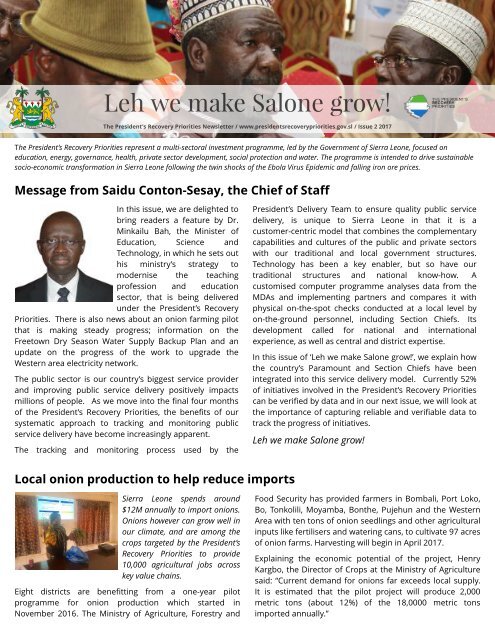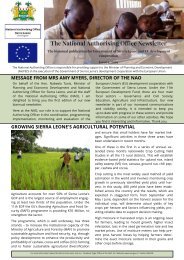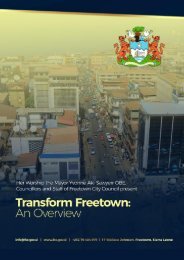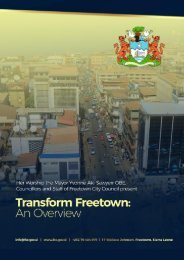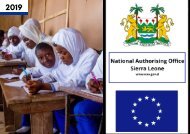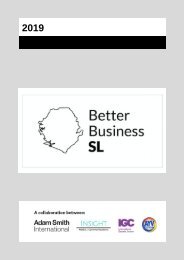Leh we make Salone grow! Issue 5
This newsletter is brought to you by the President's Delivery Team. It contains news and updates about the President's Recovery Priorities. In this issue: Dr Minkailu Bah, Minister of Education sets out his vision for the education sector in Sierra Leone; the energy sector takes possession of four custom built transformers; we take a look at Freetown's dry season water supply plan; and look at MAFFS plans to make Sierra Leone self-sufficient in onions.
This newsletter is brought to you by the President's Delivery Team. It contains news and updates about the President's Recovery Priorities. In this issue: Dr Minkailu Bah, Minister of Education sets out his vision for the education sector in Sierra Leone; the energy sector takes possession of four custom built transformers; we take a look at Freetown's dry season water supply plan; and look at MAFFS plans to make Sierra Leone self-sufficient in onions.
You also want an ePaper? Increase the reach of your titles
YUMPU automatically turns print PDFs into web optimized ePapers that Google loves.
<strong>Leh</strong> <strong>we</strong> <strong>make</strong> <strong>Salone</strong> <strong>grow</strong>!<br />
The President 's Recovery Priorit ies New slet t er / w w w.president srecoverypriorit ies.gov.sl / <strong>Issue</strong> 2 2017<br />
The President?s Recovery Priorities represent a multi-sectoral investment programme, led by the Government of Sierra Leone, focused on<br />
education, energy, governance, health, private sector development, social protection and water. The programme is intended to drive sustainable<br />
socio-economic transformation in Sierra Leone following the twin shocks of the Ebola Virus Epidemic and falling iron ore prices.<br />
Message from Saidu Cont on-Sesay, t he Chief of St aff<br />
In this issue, <strong>we</strong> are delighted to<br />
bring readers a feature by Dr.<br />
Minkailu Bah, the Minister of<br />
Education, Science and<br />
Technology, in which he sets out<br />
his ministry?s strategy to<br />
modernise the teaching<br />
profession and education<br />
sector, that is being delivered<br />
under the President?s Recovery<br />
Priorities. There is also news about an onion farming pilot<br />
that is making steady progress; information on the<br />
Freetown Dry Season Water Supply Backup Plan and an<br />
update on the progress of the work to upgrade the<br />
Western area electricity network.<br />
The public sector is our country?s biggest service provider<br />
and improving public service delivery positively impacts<br />
millions of people. As <strong>we</strong> move into the final four months<br />
of the President?s Recovery Priorities, the benefits of our<br />
systematic approach to tracking and monitoring public<br />
service delivery have become increasingly apparent.<br />
The tracking and monitoring process used by the<br />
President?s Delivery Team to ensure quality public service<br />
delivery, is unique to Sierra Leone in that it is a<br />
customer-centric model that combines the complementary<br />
capabilities and cultures of the public and private sectors<br />
with our traditional and local government structures.<br />
Technology has been a key enabler, but so have our<br />
traditional structures and national know-how. A<br />
customised computer programme analyses data from the<br />
MDAs and implementing partners and compares it with<br />
physical on-the-spot checks conducted at a local level by<br />
on-the-ground personnel, including Section Chiefs. Its<br />
development called for national and international<br />
experience, as <strong>we</strong>ll as central and district expertise.<br />
In this issue of ?<strong>Leh</strong> <strong>we</strong> <strong>make</strong> <strong>Salone</strong> <strong>grow</strong>!?, <strong>we</strong> explain how<br />
the country?s Paramount and Section Chiefs have been<br />
integrated into this service delivery model. Currently 52%<br />
of initiatives involved in the President?s Recovery Priorities<br />
can be verified by data and in our next issue, <strong>we</strong> will look at<br />
the importance of capturing reliable and verifiable data to<br />
track the progress of initiatives.<br />
<strong>Leh</strong> <strong>we</strong> <strong>make</strong> <strong>Salone</strong> <strong>grow</strong>!<br />
Local onion product ion t o help reduce im port s<br />
Sierra Leone spends around<br />
$12M annually to import onions.<br />
Onions ho<strong>we</strong>ver can <strong>grow</strong> <strong>we</strong>ll in<br />
our climate, and are among the<br />
crops targeted by the President?s<br />
Recovery Priorities to provide<br />
10,000 agricultural jobs across<br />
key value chains.<br />
Eight districts are benefitting from a one-year pilot<br />
programme for onion production which started in<br />
November 2016. The Ministry of Agriculture, Forestry and<br />
Food Security has provided farmers in Bombali, Port Loko,<br />
Bo, Tonkolili, Moyamba, Bonthe, Pujehun and the Western<br />
Area with ten tons of onion seedlings and other agricultural<br />
inputs like fertilisers and watering cans, to cultivate 97 acres<br />
of onion farms. Harvesting will begin in April 2017.<br />
Explaining the economic potential of the project, Henry<br />
Kargbo, the Director of Crops at the Ministry of Agriculture<br />
said: ?Current demand for onions far exceeds local supply.<br />
It is estimated that the pilot project will produce 2,000<br />
metric tons (about 12%) of the 18,0000 metric tons<br />
imported annually.?
Dry season w at er supply plan for Freet ow n.<br />
He assured the audience of the Government?s<br />
commitment to ensuring safe water for Freetown?s<br />
population. ?We are fully conscious of the responsibility<br />
<strong>we</strong> bear to Freetown and its people. We are fully<br />
conscious of the social and economic impact of the dry<br />
season on households in the city. The key focus of the Dry<br />
Season Water Supply Backup Plan is to ensure a coherent<br />
and integrated response that mitigates these. If all the<br />
men and women of Freetown work with us to <strong>make</strong> this<br />
plan a success, the measures <strong>we</strong> have put in place will<br />
support us through this challenging period.?<br />
Flexibility to tackle urgent public service delivery needs has<br />
been built into the design of the President?s Recovery Priorities<br />
process. Working with the President?s Delivery Team, the<br />
Ministry of Water Resources (MWR) and Guma Valley Water<br />
Company (GVWC) have developed a comprehensive dry<br />
season plan in collaboration with the UNDP, DFID, and<br />
UNICEF to manage water supply in Freetown.<br />
The Minister of Water Resources, Momodu Maligi<br />
launched the 2017 Freetown Dry Season Water Supply<br />
Backup Plan at Baoma in Goderich on 31st January 2016,<br />
during a ceremony to hand over the community?s new<br />
solar-po<strong>we</strong>red borehole. The solar-po<strong>we</strong>red borehole is<br />
one of t<strong>we</strong>nty-two around Freetown, that are being<br />
fast-tracked as part of the plan.<br />
Speaking at the launch, the Minister thanked stakeholders<br />
such as development partners, the Ministry of Finance and<br />
Economic Development, the Sierra Leone Water Company,<br />
the President?s Delivery Team, Strategy and Policy Unit,<br />
Freetown WASH Consortium and all of Freetown?s<br />
councillors and community stakeholders for being part of<br />
the planning process.<br />
The 2017 Freetown Dry Season Water Supply Backup Plan<br />
was developed as part of the President?s Recovery<br />
Priorities process. Learning from the experience of<br />
previous dry seasons, MOWR and GVWC started planning<br />
in September last year, to ensure that regular access to<br />
safe water around Freetown would be maintained.<br />
The plan entails implementation of a robust water<br />
rationing schedule to ensure that water supplied through<br />
the network is equitably distributed around the city.<br />
Additional water sources include the construction of<br />
t<strong>we</strong>nty-two new boreholes in areas like Gloucester,<br />
Leicester, Old Wharf, Calaba Town, Allen Town, Wellington<br />
and Kissy. These complement a programme of<br />
rehabilitating 20 existing boreholes and protected <strong>we</strong>lls,<br />
and the construction of four industrial boreholes in<br />
Babadorie, Brookfields and Kissy.<br />
Communities not connected to the GVWC network will be<br />
kept supplied with water by bowsers. To reduce the<br />
significant water loss resulting from ?created leaks?or pipe<br />
cutting, dedicated rapid response teams have been<br />
established to monitor and repair leaking pipes quickly<br />
and efficiently along the ten zones in Freetown, and a<br />
freephone number - 246 - set up to allow the public to<br />
report any concerns.<br />
He outlined the complex causes of the city?s water<br />
shortages saying: ?The Guma Dam is the source of 98% of<br />
Freetown?s water. It is backed up by other smaller sources<br />
? Allen Town, White Water, Blue Water and Babadorie.<br />
Freetown?s dilapidated water supply infrastructure and the<br />
severe environmental degradation of crucial water<br />
catchment zones around dams like Guma Valley and<br />
Babadorie, mean that current water supply cannot reliably<br />
meet the needs of Freetown?s rapidly expanding<br />
population.<br />
Added to this is the widespread practice of cutting water<br />
pipes or ?created leaks? which allows 40% of the water<br />
supplied by Guma Valley to be wasted.?
Tow ards a m odernised educat ion syst em w hich can m eet t he challenges<br />
and opport unit ies of our fut ure<br />
By Dr. Minkailu Bah, the Minister of Education, Science and Technology<br />
Our population is a<br />
young one - over<br />
40% is below 15<br />
years old. An<br />
increasingly<br />
youthful<br />
population is not<br />
exclusive to Sierra<br />
Leone. Africa has<br />
more people aged<br />
under 20 than<br />
anywhere in the<br />
world. UNICEF<br />
estimates that over<br />
the next four<br />
decades, 40% of<br />
the world?s children<br />
and roughly 25% of<br />
the global<br />
population will be<br />
in Africa. The possible implications of this trend have<br />
polarised commentators. One camp frames our youthful<br />
populations as a great opportunity; the other as a great<br />
risk. In the first scenario, our youth bulge is a competitive<br />
advantage that sets us apart from industrialised countries,<br />
many of which have rapidly aging populations.<br />
Those who take the opposite position argue that in an<br />
environment of unemployment, low wages, and the need<br />
for substantial ongoing investment in health, education,<br />
and infrastructure, our overwhelmingly youthful<br />
population is a potentially significant risk to political and<br />
economic stability.<br />
For my Ministry and its stakeholders in the education<br />
sector, this is a time of great challenge, responsibility and<br />
opportunity. We know that education has the po<strong>we</strong>r to<br />
change nations. It can help prevent poverty and social<br />
exclusion, ensure human and civic values are maintained<br />
and help tackle all forms of discrimination. Educated<br />
citizens have the necessary skills to succeed in the labour<br />
market. They are key to improved economic <strong>grow</strong>th and<br />
employment in Sierra Leone and in the sub-region.<br />
Progress in recent years has been encouraging.<br />
Seventy-six percent of students finish primary school,<br />
which is above the average for Sub-Saharan Africa, and<br />
77% of these advance to JSS level. Yet too many of our<br />
young people, especially in rural areas, still lack adequate<br />
access to really high quality learning and teaching.<br />
Take for example, the high level of repetition in primary<br />
schools. At 15.6%, this indicates a need to increase the<br />
quality of our teaching and schools. The Ministry of<br />
Education, Science and Technology and the Teaching<br />
Service Commission are collaborating with national and<br />
international stakeholders and partners, to accelerate the<br />
modernisation of our education system. As part of this<br />
strategy, a Le257 billion ($34.3 million) investment in a<br />
series of urgent initiatives is being delivered under the<br />
President?s Recovery Priorities.<br />
These are intended to rapidly improve learning outcomes.<br />
They include the construction of 500 classrooms in<br />
schools across the country to reduce severe over-crowding<br />
in the worst affected schools; visiting schools nationwide<br />
to ensure they meet standards to be certified as<br />
Government approved; and a national school-feeding<br />
programme for all GoSL/GoSL assisted primary schools.<br />
The Accelerated Teaching syllabi that <strong>we</strong> produced in<br />
August 2015, was a successful response to the time lost<br />
due to Ebola. We are building on this with new lesson<br />
plans in language arts and mathematics, across all<br />
primary and JSS school grades. These give teachers the<br />
support they need to cover each element of the national<br />
curriculum and are complemented with training for<br />
in-service teachers.<br />
Our teachers are the backbone of a strong and vibrant<br />
education system and the Teachers? Payroll Verification<br />
and School Mapping Exercise will help our work in this<br />
area. It will support MEST in capturing, protecting and<br />
providing reliable information in the electronic<br />
environment. It is a critical step towards a strong financial<br />
and information management system which will lead to<br />
more effective teacher remuneration and professional<br />
development. This is essential to ensuring that <strong>we</strong> are<br />
allocating teaching and learning resources appropriately,<br />
where, how and to whom they are most needed. MEST<br />
also uses a Situation Room to monitor progress at an<br />
individual school level using indicators such as: pupil and<br />
teacher attendance, condition of WASH facilities, and<br />
school feeding, etc. This allows us to identify and resolve<br />
impediments to teaching and learning. The successful<br />
implementation of these initiatives will give the education<br />
sector an even stronger base from which <strong>we</strong> can progress<br />
towards the goals that <strong>we</strong> set out in the Agenda for<br />
Prosperity.
Four t ransform ers arrive as part of w ork t o upgrade Freet ow n?s elect ricit y net w ork<br />
The rapid construction of the 66kV Wellington Express line<br />
ensured that 26,000 customers in the Western Area, remained<br />
connected to po<strong>we</strong>r during upgrades to the local network.<br />
Work continues with the arrival of four transformers earlier<br />
this year.<br />
On Tuesday 24th January 2017, a special cargo ship<br />
docked at Queen Elizabeth Quay to offload four custom<br />
built transformers. These will support, the President?s<br />
Recovery Priorities?initiative to double operational po<strong>we</strong>r<br />
generation capacity from 75MW to 150M. The largest of<br />
them is 40MVA while the other three are 20MVA each.<br />
They will be installed in four locations - Kingtom,<br />
Wilberforce, Ropoti, and Wellington. it is expected they<br />
will increase the transfer capacity of the distribution and<br />
transmission system; boosting EDSA?s operational and<br />
commercial performance and supporting access to<br />
electricity across the Western Area.<br />
transformers will break down and convert energy supplied<br />
from hydro and thermal sources to a required minimum<br />
before transmitting to homes, businesses and offices:<br />
?This is a very important step in our energy sector<br />
strategy. These transformers will not only provide quality<br />
electricity but also connect more customers and provide<br />
backups in times of po<strong>we</strong>r outages in the city,? he said.<br />
According to Henry Macauley, the Energy Minister, the<br />
President ?s Delivery Team enlist s Sect ion Chiefs t o support dist rict delivery<br />
In Kholifa Rowalla Chiefdom in Tonkolili, Old Town Section<br />
Chief Amadu Lakkoh has full details on the new<br />
classrooms that are being built for TDC Girls? Primary<br />
School. The work is expected to be completed by 30th<br />
June this year. Chief Amadu Lakkoh can check up on the<br />
progress because the President?s Delivery Team has<br />
shared this information with him.<br />
As part of a strategy to further decentralise the President?s<br />
Recovery Priorities process and verify public service<br />
delivery in the districts, the President?s Delivery Team is<br />
sharing detailed section level information on a number of<br />
initiatives to be delivered by the Ministries of Health;<br />
Education, Science and Technology; Water Resources; and<br />
Agriculture, Forestry and Food Security. So like all the<br />
other section chiefs in the country, Chief Amadu Lakkoh<br />
also has precise information on boreholes, toilets, and<br />
insecticidal nets, if and when reforestation will occur, or<br />
drying floors will be constructed, which schools are<br />
entitled to school feeding and a range of other indicators.<br />
This allows the section chiefs to track delivery and report<br />
any issues such as delays or other challenges, to the<br />
President?s Delivery Team.<br />
Eighty-three percent of donor funding for the President?s<br />
Recovery Priorities goes directly from the funding partners<br />
to implementing partners. Encouraging the Section Chiefs<br />
to personally verify that these implementing partners<br />
have carried out the work they have been contracted to, is<br />
an important strategic development that supports<br />
improvements in public service delivery, increases<br />
confidence in the President?s Recovery Priorities process<br />
and its data, and empo<strong>we</strong>rs the district governance<br />
structure. Towards the end of last year, the President?s<br />
Delivery Team organised a tour of the districts where<br />
district representatives from the Ministries of Water<br />
Resources; Education, Science and Technology and<br />
Agriculture, Forestry and Food Security, shared detailed<br />
information on initiatives taking place under the<br />
President?s Recovery Priorities, with Paramount Chiefs and<br />
their Section Chiefs.<br />
Bet<strong>we</strong>en 22nd November and 9th December, the PDT<br />
visited 12 districts. At these events, 830 pages of targets<br />
at chiefdom and section level <strong>we</strong>re distributed to 141<br />
Paramount Chiefs or their representatives and 997<br />
Section Chiefs or their representatives. Chiefs heard<br />
presentations from priority sector MDA personnel and<br />
<strong>we</strong>re able to share feedback and concerns. Many had<br />
never before received such detailed information on public<br />
service initiatives in their communities.<br />
Commenting on the further decentralisation of the<br />
President?s Recovery Priorities, Saidu Conton-Sesay, Chief<br />
of Staff, says that the inclusion of traditional structures<br />
into the public service delivery process increases its<br />
likelihood of success: ?The traditional governance<br />
structure is an important reference point for large<br />
sections of the district population. It allows us to cascade<br />
important information on the Recovery Priorities into the<br />
districts as <strong>we</strong>ll as receive valuable feedback and verified<br />
data from the ground. By incorporating our Chiefdom<br />
structures within the President?s Recovery Priorities, <strong>we</strong><br />
create a better environment for successful public sector<br />
delivery.?


